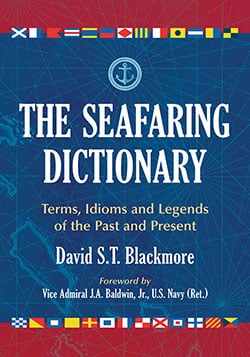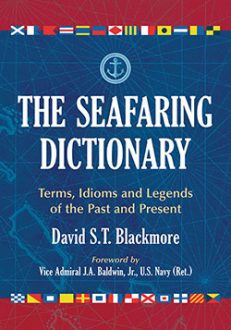The Seafaring Dictionary
Terms, Idioms and Legends of the Past and Present
$49.95
In stock
About the Book
The specialized language of seafarers is a complex mixture of the strange and the familiar, incorporating words from a variety of English dialects and foreign languages, and peppered with coined phrases and slang words. With its many intricate nuances, “navalese” is vitally important to a profession in which technical concepts need to be communicated briefly and accurately.
This dictionary defines and discusses more than 9000 nautical terms, abbreviations, slang expressions, customs and events, including terms now grown obsolete. Tables add detail about wind and wave measurements, notations, signals, navigation rules, rank and ratings.
About the Author(s)
Bibliographic Details
David S.T. Blackmore
Format: softcover (7 x 10)
Pages: 398
Bibliographic Info: tables, appendix, bibliography, index
Copyright Date: 2009
pISBN: 978-0-7864-4266-9
eISBN: 978-0-7864-5342-9
Imprint: McFarland
Table of Contents
Foreword by Vice Admiral J.A. Baldwin, Jr., U.S. Navy (Ret.) 1
Preface 3
Introduction 7
The Dictionary 15
Appendix: Real and Speculative Sea Monsters 367
Tables:
1. A—Beaufort’s Original Scale. B—The Modern Beaufort Scale 371
2. The Douglas Scales 371
3. Pierson-Moskowitch Sea State 372
4. World Meteorological Organization Sea State Codes 373
5. The Saffir-Simpson Hurricane Scale 373
6. Wind Speed Scales Compared 373
7. COLREGS (Navigation Rules or Rules of the Road) 374
8. International Flag Signals 375
9. Sound and Light Signals 377
10. Distress Signals 377
11. Examples of Phonetic Alphabets 378
12. International Standard 8601 378
13. Comparative Officer Ranks 379
14. NATO and United States Rank Codes 380
15. The Evolution of United States Navy Officer Titles 380
16. Equivalent U.S. and Foreign Naval Officer Ranks 381
17. Boxing the Compass 381
Bibliography 383
Index 385
Book Reviews & Awards
“guides the reader through centuries of terms and idioms of the sea. Blackmore’s dictionary should find a home on the reference shelves of libraries and in the hands of landlubber readers interested in the language of the sea. Recommended”—Choice; “easy-to-use and convenient…a useful work”—ARBA “the inquiring reader cannot fail to be impressed by the wide extent of the author’s knowledge. The dictionary will be helpful to all readers who wish to inform themselves about the ways of sailors and the sea, and can be recommended to libraries with an interest in that important aspect of society”—Reference Reviews; “thumbs-up…for its overall treatment and accuracy”—The Bosun’s Chronicle; “Blackmore’s work is likely to become a standard reference for naval organization, practice, and idiom from the 1940s to the present day”—Nautical Research Journal; “a valuable contribution to the canon…by recognizing that sailors see the world differently to landlubbers, Blackmore has produced a work with much of interest to both”—The Naval Review.





